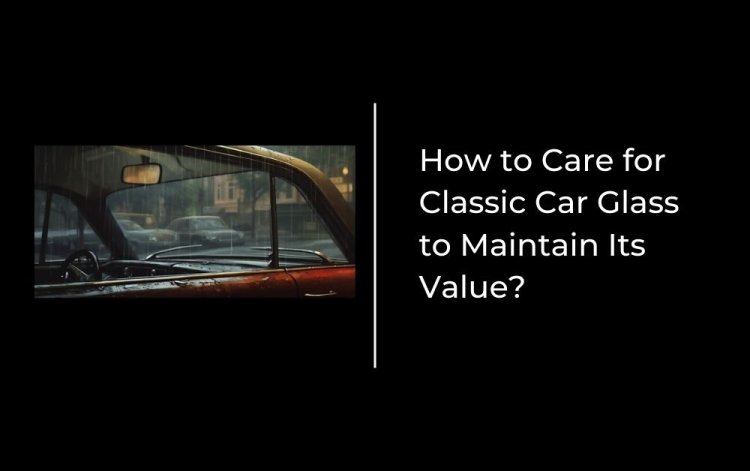How to Care for Classic Car Glass to Maintain Its Value?

Caring for the glass on a classic car is crucial not only for maintaining visibility and safety but also for preserving its overall value and appearance. Classic cars are treasures that embody history and nostalgia, and every detail counts in keeping them in pristine condition. This guide will explore the best practices for maintaining the glass on your classic car, ensuring it remains as immaculate as the rest of your vehicle.
Importance of Glass Care in Classic Cars
Why Is Glass Care Important for Classic Cars?
Glass in classic cars isn't just about aesthetics; it plays a significant role in the vehicle's integrity and value. Properly maintained glass can prevent problems like leaks, rust, and deterioration of the car’s interior. Moreover, clear and undamaged glass ensures safe driving, which is paramount when handling such valuable vehicles.
The Challenges of Maintaining Classic Car Glass
Classic car glass can be challenging to maintain because it may not have the protective coatings or treatments that modern automotive glass does. Older glass is more susceptible to scratching, staining, and other forms of damage that can detract from the car's appearance and reduce its value.
Regular Cleaning: The First Step in Glass Care
How to Clean Classic Car Glass Properly
Choose the Right Cleaning Products
Start by selecting the right cleaning products. Avoid ammonia-based cleaners as they can damage old glass and surrounding rubber seals. Instead, use a gentle, automotive-specific glass cleaner that removes dirt without leaving streaks or harming the glass.
Use Proper Cleaning Techniques
Use a microfiber cloth or a newspaper to clean the glass. These materials are gentle on glass surfaces and help avoid scratches. Spray the cleaner directly onto the cloth rather than the glass to prevent overspray that can damage non-glass parts with harsh chemicals.
Regular Cleaning Schedule
Establish a regular cleaning schedule to keep the glass in excellent condition. Cleaning the glass at least once a week will prevent dirt and grime from building up, which can cause long-term damage if left unchecked.
Protecting the Glass from Environmental Damage
Use of Protective Coatings
Applying a protective coating can significantly extend the life of the glass. Products like ceramic coatings or even wax can provide a protective layer that repels water, dirt, and UV rays, reducing the risk of scratches and etching.
Storing Your Classic Car Properly
When not in use, store your classic car in a garage or under a car cover. This will protect the glass from environmental elements like sun, rain, and debris, which can cause etching and fading over time.
Addressing Scratches and Minor Imperfections
How to Deal with Scratches
If you notice scratches on your classic car’s glass, it’s important to address them promptly. Small scratches can often be polished out with a glass polishing compound. However, deeper scratches might require professional attention to avoid worsening the problem.
DIY Glass Repair Kits
For minor scratches and chips, a DIY glass repair kit can be a cost-effective solution. These kits usually contain a polishing compound and a special pad that can be used to gently buff away small imperfections without the need for professional help.
Replacing Damaged or Deteriorated Glass
When to Consider Glass Replacement
Sometimes, the damage to the glass may be too extensive for repairs. In such cases, replacing the glass is the best option to maintain the vehicle’s value and aesthetic integrity. Signs that you need a glass replacement include large cracks, chips that obscure the driver’s vision, or severe scratches.
Choosing the Right Replacement Glass
When replacing the glass on a classic car, it’s crucial to choose the right type of glass that matches the original specifications. This may mean sourcing vintage glass or having a piece custom-made to ensure it fits perfectly and maintains the car’s authentic look.
Regular Inspections and Professional Maintenance

Scheduling Regular Inspections
Regular inspections by a professional can help identify potential issues with your classic car’s glass before they become serious problems. Have your vehicle checked by a specialist who understands classic cars and can offer advice tailored to your specific model.
The Role of Professional Cleaners and Restorers
Sometimes, it's best to leave the cleaning and restoration of classic car glass to professionals, especially if the glass is delicate or significantly damaged. Professional cleaners have the tools and expertise to restore glass without causing additional harm, ensuring that your classic car’s glass is in the best possible condition.
Conclusion
Maintaining the glass on a classic car requires careful attention to detail and a commitment to regular care. By following the steps outlined above, you can ensure that your classic car’s glass remains as flawless as the day the vehicle rolled off the production line. Not only does this enhance your driving experience, but it also plays a crucial role in maintaining or even increasing the value of your cherished classic car. Whether through regular cleaning, applying protective coatings, or consulting with professionals, the effort you put into caring for your classic car’s glass will pay dividends in both aesthetics and value.
Note:- For read more articles visit on blog.rackons.















